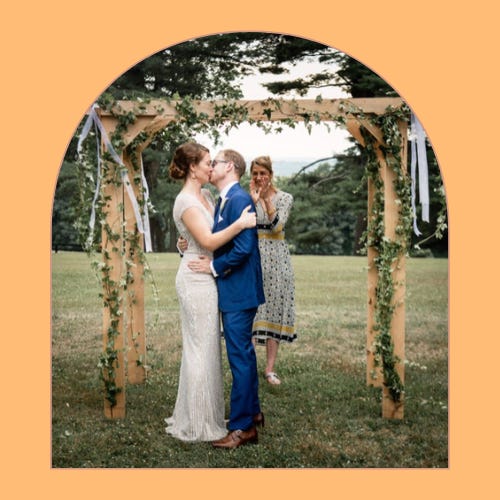📿 The Path of Marriage
Ostensibly a Valentine's Day post on discomfort, taking vows, and advice on devotion from an 11th century meditation master
Fun fact: this image is also the background of my laptop so I gaze at it daily
I was six years old when I took my first Buddhist vow.
The story goes that the Buddhist teacher Dzigar Kongtrul Rinpoche was in town and there were kids a few years older than me who decided they wanted to take refuge, i.e. officially become Buddhist. Spontaneously, I decided to join them in taking the refuge vow. My parents, understandably, wanted to make sure I knew what I was getting myself into, but at the age of six I was articulate enough that they shrugged and let me do it.
While kneeling next to one of the other kids - we’ll call him Max - I was asked to repeat traditional Buddhist vows alongside the group. Finally we got to the point where you would say “I [and you say your name] take refuge in the Buddha, the dharma and the sangha.” Max and I both said, “I, Max, take refuge in the Buddha, the dharma and the sangha.”
Rinpoche stopped. “Let’s try that again,” he said, “and use our own names.”
Once again I said, “I, Max, take refuge in the Buddha, the dharma and the sangha.”
He paused. We tried it a third time…with the same result.
“You,” he said, pointing at me, “say your name.”
“Paul Rinzler.”
“Good enough,” he said, and we moved on.
It’s traditional to offer someone a Buddhist name at the end of this ceremony and, with my having botched it three times, Rinpoche had the good sense of humor to offer me the name Lodro Thadel, or “Boundless Intellect.” That, incidentally, is how I got the name Lodro.
There are other vows I have taken along the Buddhist path. With each one I have gained a bit more understanding and taken it a bit more seriously. I took the bodhisattva vow when I was eighteen, where one commits to being of benefit to others in this and all future lives. That is the one that has been a guiding principle for my work ever since.
Even before I met Adreanna, I would reference the marriage vow as a good analogy for what it’s like to take the refuge vow. Could you be Buddhist all your life and not get up in front of people and proclaim it with a vow? Of course. But there’s real power to doing so. It feels different to say your commitment out loud.
Similarly, you could spend all your years in love with another person and never have a marriage ceremony to acknowledge that. When you put it in that context, it becomes a very personal thing as to whether someone wants to proclaim their commitment or not.
All of this being said, when it came time to consider the marriage vow, I took the decision pretty seriously. To commit to spending my remaining days with one person is a major commitment. It takes true devotion to the path of being in a relationship to make that work.
The Buddhist term “devotion” can be a difficult one to grasp. I have been reading some early community talks from the 11th century meditation master Gampopa. He spoke extensively about devotion, balancing two aspects of what the Buddha taught.
Keep reading with a 7-day free trial
Subscribe to The Laundry to keep reading this post and get 7 days of free access to the full post archives.






